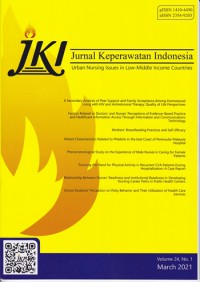
Jurnal
Mothers’ Breastfeeding Practices and Self-Efficacy
This study examined breastfeeding practices and self-efficacy among mothers residing in rural areas. A cross-sectional study was conducted for 104 mothers via purposeful sampling in a Posyandu (maternal and child health service) in Kampar district, one of the rural areas in Riau, Indonesia. The Breastfeeding Self-Efficacy Scale Short Form (BSES-SF) was used in the questionnaires to collect data. Chi-square test was used for bivariate analysis. Majority of the respondents (71.2%) were 20–35 years old; 69.3% of the respondents’ level of education were low (such as junior and senior high school levels). Approximately 91.3% of them were housewives. Exclusive breastfeeding prevalence was only 30.8%, with insufficient milk being the most common reasons cited by the mothers as failure to breastfeed exclusively. Porridge and mineral water were the most commonly supplied food given to babies under 6 months among 31.7% and 36.5% mothers, respectively. The respondents faced some breast problems, where 72.1% mothers did not have good breastfeeding skills. Approximately 59.6% mothers had higher breastfeeding self-efficacy than the mean score for BSES-SF, which was 58.58 (11.58 standard deviation [SD]). Mothers’ age was significantly correlated with the BSES among mothers (p < 0.01). Increasing young mother’s breastfeeding self-efficacy during the antenatal care period is important to lower these young mothers’ perception of having insufficient milk.
Availability
No copy data
Detail Information
- Series Title
-
Jurnal Keperawatan Indonesia, Vol. 24 No. 1, March 2021
- Call Number
-
(05) 610.5 (910) FAK j
- Publisher
- Depok : Fakultas Keperawatan UI., 2021
- Collation
-
Hlm. 17-24
- Language
-
English
- ISBN/ISSN
-
1410-4490
- Classification
-
(05) 610.5 (910) FAK j
- Content Type
-
-
- Media Type
-
-
- Carrier Type
-
-
- Edition
-
Vol. 24 No. 1
- Subject(s)
- Specific Detail Info
-
-
- Statement of Responsibility
-
-
Other version/related
No other version available
File Attachment
Comments
You must be logged in to post a comment
 Computer Science, Information & General Works
Computer Science, Information & General Works  Philosophy & Psychology
Philosophy & Psychology  Religion
Religion  Social Sciences
Social Sciences  Language
Language  Pure Science
Pure Science  Applied Sciences
Applied Sciences  Art & Recreation
Art & Recreation  Literature
Literature  History & Geography
History & Geography